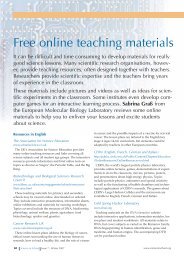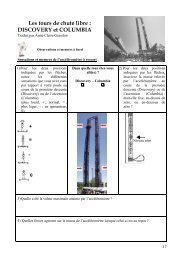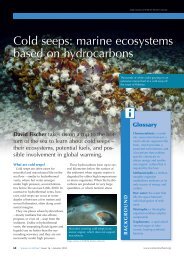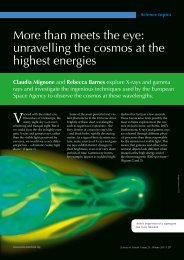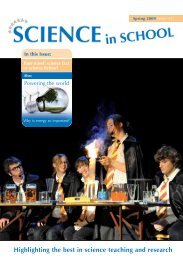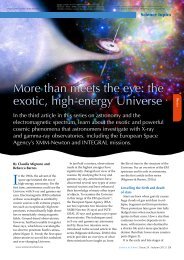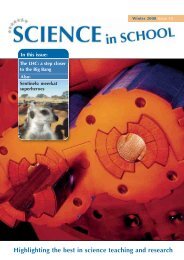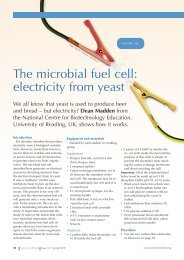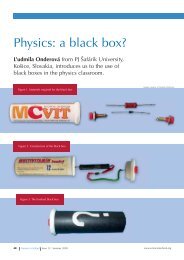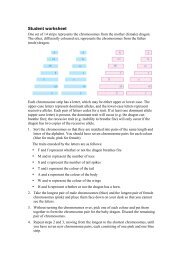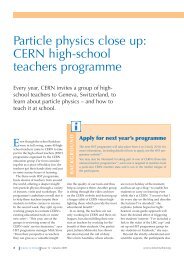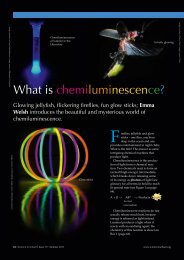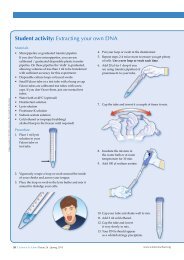Download Issue 14 as PDF [5.4 MB] - Science in School
Download Issue 14 as PDF [5.4 MB] - Science in School
Download Issue 14 as PDF [5.4 MB] - Science in School
You also want an ePaper? Increase the reach of your titles
YUMPU automatically turns print PDFs into web optimized ePapers that Google loves.
Images courtesy of Werner Stetzenbach<br />
Physics <strong>in</strong> k<strong>in</strong>dergarten<br />
and primary school<br />
General <strong>Science</strong><br />
Biology<br />
Physics<br />
Primary<br />
Images courtesy of Werner Stetzenbach<br />
Werner and Gabriele<br />
Stetzenbach tell us<br />
how k<strong>in</strong>dergarten<br />
and primary-school<br />
children discover<br />
the world of physics<br />
together with secondary-school<br />
students<br />
<strong>as</strong> their mentors.<br />
Why not try it <strong>in</strong><br />
your school?<br />
REvIEW<br />
This is an <strong>in</strong>novative and stimulat<strong>in</strong>g way of <strong>in</strong>troduc<strong>in</strong>g science<br />
to young children. The experiments are simple, yet effective<br />
enough to expla<strong>in</strong> how the ear works. At a time when the<br />
use of earphones is <strong>in</strong>cre<strong>as</strong><strong>in</strong>g, one could use the project to<br />
highlight how the ear can e<strong>as</strong>ily be damaged and what happens<br />
<strong>in</strong> such c<strong>as</strong>es.<br />
The article can be used by two separate audiences: the first are<br />
k<strong>in</strong>dergarten and primary-school teachers. They can use the<br />
experiments detailed <strong>in</strong> this article and the additional activities<br />
developed by the project (available onl<strong>in</strong>e) <strong>in</strong> their cl<strong>as</strong>sroom.<br />
Some k<strong>in</strong>dergarten and primary-school teachers may f<strong>in</strong>d it difficult<br />
because they do not have the necessary science background;<br />
this problem may be overcome through prior preparation,<br />
the help of a science specialist or the <strong>as</strong>sistance of prepared<br />
secondary-school students, <strong>as</strong> <strong>in</strong> the presented project.<br />
Suggested background read<strong>in</strong>g material can also be found <strong>in</strong><br />
the ‘Resources’ section.<br />
For secondary-school science teachers, the article provides<br />
details of how to set up a similar project with their students. If<br />
secondary-school students are <strong>in</strong>volved, then such a project<br />
can be very motivat<strong>in</strong>g for them and should also help them to<br />
grow <strong>in</strong>to more responsible adults.<br />
The experiments are ideal to use for primary/k<strong>in</strong>dergarten science,<br />
but may also be used <strong>in</strong> <strong>in</strong>tegrated/coord<strong>in</strong>ated science.<br />
They are helpful for biology lessons to teach about the ear and<br />
hear<strong>in</strong>g, and for physics lessons, to teach about the transmission<br />
of sound, the ear <strong>as</strong> a real-life application for the transmission<br />
of sound, or clean<strong>in</strong>g us<strong>in</strong>g ultr<strong>as</strong>ound (jostl<strong>in</strong>g of dirt particles<br />
<strong>in</strong>stead of the jelly babies).<br />
Paul Xuereb, Malta<br />
48 <strong>Science</strong> <strong>in</strong> <strong>School</strong> <strong>Issue</strong> <strong>14</strong> : Spr<strong>in</strong>g 2010<br />
www.science<strong>in</strong>school.org


![Download Issue 14 as PDF [5.4 MB] - Science in School](https://img.yumpu.com/26126440/50/500x640/download-issue-14-as-pdf-54-mb-science-in-school.jpg)
